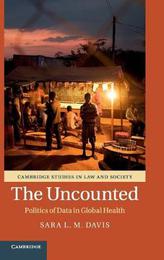
|
The Uncounted: Politics of Data in Global Health
Hardback
Main Details
| Title |
The Uncounted: Politics of Data in Global Health
|
| Authors and Contributors |
By (author) Sara L.M. Davis
|
| Series | Cambridge Studies in Law and Society |
|---|
| Physical Properties |
| Format:Hardback | | Pages:225 | | Dimensions(mm): Height 235,Width 155 |
|
| ISBN/Barcode |
9781108483360
|
| Classifications | Dewey:362.1969792 |
|---|
| Audience | | Professional & Vocational | |
|---|
| Illustrations |
Worked examples or Exercises; 6 Tables, black and white; 5 Halftones, black and white; 14 Line drawings, black and white
|
|
Publishing Details |
| Publisher |
Cambridge University Press
|
| Imprint |
Cambridge University Press
|
| Publication Date |
11 June 2020 |
| Publication Country |
United Kingdom
|
Description
In the global race to reach the end of AIDS, why is the world slipping off track? The answer has to do with stigma, money, and data. Global funding for AIDS response is declining. Tough choices must be made: some people will win and some will lose. Global aid agencies and governments use health data to make these choices. While aid agencies prioritize a shrinking list of countries, many governments deny that sex workers, men who have sex with men, drug users, and transgender people exist. Since no data is gathered about their needs, life-saving services are not funded, and the lack of data reinforces the denial. The Uncounted cracks open this and other data paradoxes through interviews with global health leaders and activists, ethnographic research, analysis of gaps in mathematical models, and the author's experience as an activist and senior official. It shows what is counted, what is not, and why empowering communities to gather their own data could be key to ending AIDS.
Author Biography
Sara L. M. Davis is based at the Graduate Institute and the Geneva Centre for Education and Research in Humanitarian Action, in Geneva. She earned her Ph.D. at University of Pennsylvania, and held postdoctoral fellowships at Yale University and UCLA. She was a researcher at Human Rights Watch and founding executive director of Asia Catalyst. She was the first senior human rights advisor at the Global Fund to Fight AIDS, TB and Malaria, and later an independent consultant. Her first book was Song and Silence: Ethnic revival on China's Southwest Borders (2005). In 2017, her research won the International Geneva Award.
Reviews'Davis vividly shows that not everything that counts can be counted, and not everything that can be counted counts. As an anthropologist, a human rights activist and a former Global Fund official, Davis is an insider and an outsider, drawing a rich, nuanced and compelling portrait of the HIV response today.' Joseph Amon, Director of Global Health, Drexel University, Dornsife School of Public Health 'In The Uncounted, Davis has successfully synthesized the complex decisions guiding bilateral and multilateral funding agencies in the HIV response. Given her own experience and that the book is informed by systematic reviews and key informant interviews, it is accurate while managing to provide a humanized narrative to international development.' Stefan Baral, Director of the Key Populations Program at the Center for Public Health and Human Rights '[The Uncounted] pushes those in global health governance to reflect on how data are selected and examined ... offering not a neatly packaged set of solutions, but instead an inclusive opportunity to contest and remake data to be people-centered.' Hanna Huffstetler and Benjamin Mason Meier, Global Public Health 'Davis provides a highly readable account of not only what these messy realities look like but, crucially, how tools of data governance work.' Sophie Harman, International Affairs '... must-read book for those academics and activists willing to get their head around the system of AIDS knowledge as well as the social and semantic spaces and new sets of relations that it sets in motion.' Julie Billaud, PoLAR: Political and Legal Anthropology Review 'The book is wide in scope and deep in breadth ... The Uncounted offers an important window into AIDS governance, opening up ways to study power and the construction of regimes of truth that shape our contemporary world. It should become a must-read book for those academics and activists willing to get their head around the system of AIDS knowledge as well as the social and semantic spaces and new sets of relations that it sets in motion.' Julie Billaud, PoLAR Online
|